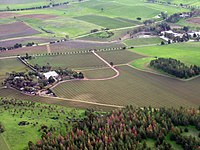
Photo from wikipedia
Abstract The significant impacts of restructuring on the transition and land use dynamics of rural settlements in China has long been a subject of academic inquiry. We applied a conceptual… Click to show full abstract
Abstract The significant impacts of restructuring on the transition and land use dynamics of rural settlements in China has long been a subject of academic inquiry. We applied a conceptual framework encompassing relations between institutional changes, actors' behaviors, and land use changes to investigate the dynamic trajectories and institutional mechanisms of rural land use in Huishan, a suburban district located in eastern China. We argue that by reshaping local actors' behaviors, institutional changes and national strategies have significantly influenced the transition of China's rural settlements. Over a period of about two decades, rural settlements in Huishan underwent expansion followed by shrinkage in recent years, which has resulted in a gradual decrease in the total scale of land use. A parallel trend of rural economic diversification has prompted a shift in the previously residential land-based structure of land use toward a more diversified structure mainly entailing residential and industrial land. However, with the macroeconomic downturn and the return of migrant laborers to their home regions, rural hollowing and the reluctance of local actors to consolidate residential land may pose severe future challenges for these settlements. In conclusion, we suggest that appropriate regulatory policies for rural settlements in transition that incorporate key requirements such as increasing employment and rehabilitating derelict rural construction land are required.
Journal Title: Habitat International
Year Published: 2017
Link to full text (if available)
Share on Social Media: Sign Up to like & get
recommendations!